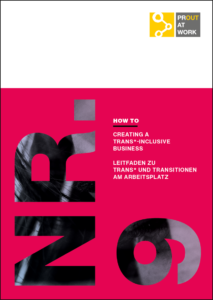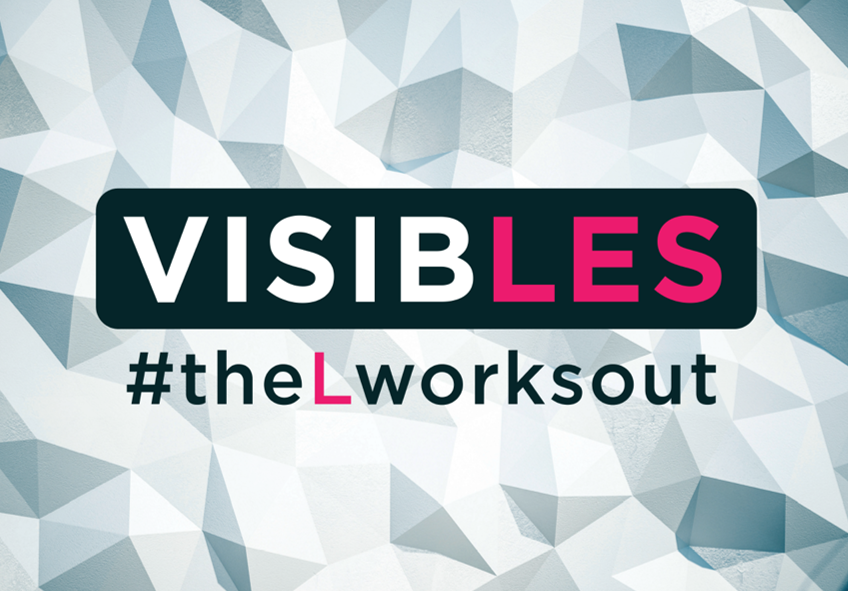
Campaign: #theLworksout for this years` Lesbian Visibility Day
Lesbian persons and Bi*sexual Women are often overlooked due to Lesbian Invisibility. To this day, there are very few visible lesbian role models-especially in a business related context. In many Networks, lesbian persons are a minority. Hence, important role models for younger colleagues aren´t guaranteed. With the Network- and Branch-encompassing campaign #theLworksout on the 26. of April, we can strenghten openly Lesbian Persons and, together with a wide spectrum of atendees, improve Visibility and point out the Diversity of Lesbian Persons.
How can i join the campaign?
- Inform yourself and speak to lesbian persons both inside your Network and outside, to raise awareness for the campaign.
- Take a portrait photo, orienting yourself on our examples, with your Tablet. It doesn´t matter if it is printed or digital. You´re welcome to use shades of grey instead of color for your portrait. (Make sure you´re allowed to use the logo of your company with your employer. If not, you may also use the company name, or hand your photo in without it.)
- Post your own campaign-photo on April 26 2023 at 10:00 AM, including the hashtags and taggings of your primary Social Media Channels.
Hashtags
#theLworksout
#LesbianVisibilityDay
#LesbianVisibility
#LesbischeSichtbarkeit
#LGBTIQBusinessLadies
#ProutAtWork
#LGBTIQRoleModels
#FlaggeFürVielfalt
Taggings
PROUT AT WORK
Facebook: @PrOut@Work
Instagram: @proutatwork
LinkedIn: @PROUT AT WORK-Foundation
Twitter: @proutatwork
If wanted, your own Company
Position your company as a supporter of the campaign and for Lesbian Visibility, and animate employees to take part.
This campaign was initiated by the PROUT AT WORK-Foundation and LGBT*IQ business-networks.
Tips for lesbian persons:
A Lesbian Coming out can still be tied to discrimination and hardships. If it helps you,
- look for Allies / Role Models in the company.
- network with the LGBT*IQ-network.
- look for support in dealing with discrimination and ill-fitting comments.
- always remember: You pick the time and place for your Coming Out.
Tips for companies:
- create sensibility for unconscious bias
- create clear expectation profiles
- anonymize applying for jobs
- Build/Strenghten internal LGBT*IQ-Networks
More information to the listed points can be found in the study “The L-Word in Business”, which deals with the situation of lesbian women in a work environment-with tips for employers.
TIps for Allies
- Inform yourself about lesbian topics.
- Use gender-inclusive language.
- Do not fetishize lesbian relationships.
- Stand up for the rights and against discrimination of Lesbian People. For example support the action nodoption, which works against the adoption of stepchildren and for the acception of Parentage in Rainbow Families.
Counseling:
Lesbenberatung Berlin
The “Lesbenberatung” is an open place for women, girls, Trans* and Inter* in different life situations.
LesMigras
LesMigraS is a branch of the “Lesbenberatung” Berlin e.V. that deals with discrimination and violence.
Letra
“LeTRa” stands for Lesben(T)Raum and is a place for meeting, counseling and event location for lesbian persons.
LIBS – Lesben Informations- und Beratungsstelle e.V.
LIBS e.V. is a psychosocial counseling office and with a goal of working against the reasons and follow up effects of discrimination against lesbian and bisexual women.
Regenbogenfamilien München
The Counseling Office in Munich works with rainbow Families to better the living conditions for them, and fight discrimination against them.
Rosa Strippe
The “Verein Rosa Strippe” is specialized on personal and individual problems of Lesbian, Gay, Bisexual, Trans* and Inter* persons, and offers help with their problems.
For a throwback and quotes to last years´ #theLworksout-campaign, take a look at our page on the Lesbian Visibility Day 2022.
Weitere hilfreiche Informationen und Interviews finden Sie auch in unserem Beitrag
zum Lesbian Visibility Day 2021.
We´re looking forward to your appliance!
More questions? Just contact us in our office!
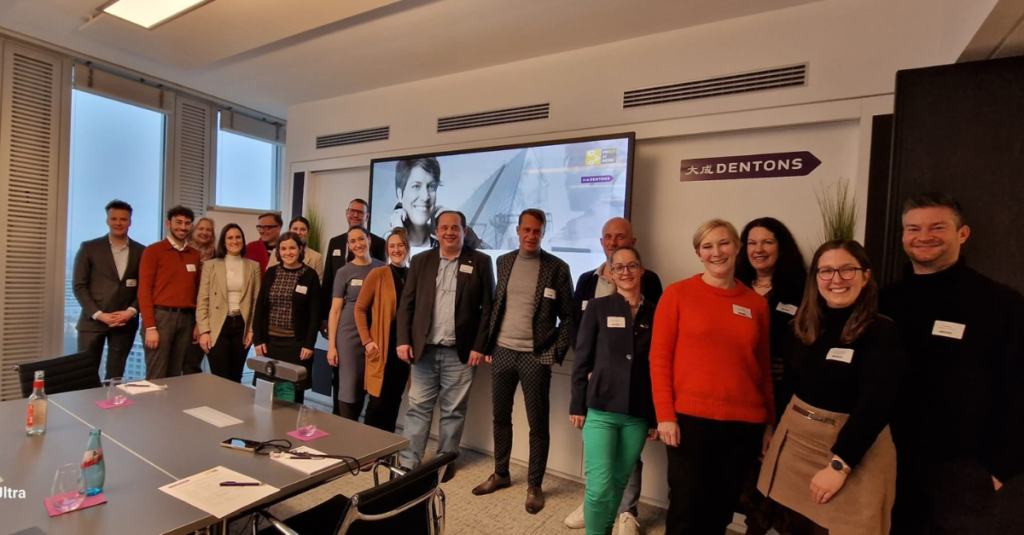
The focus of the activities and also the challenges for LGBTIQ in the work environment vary depending on the industry – therefore PROUT AT WORK, together with co-initiator Dentons, set the starting signal for a regular, industry-internal exchange: LGBTIQ in Law.
Contrary to all possible competitive situations regarding clients, the law firms were united in this case by the goal: to learn from each other, to motivate and inspire each other – for LGBT*IQ with equal opportunities in the workplace. “If we want to make a lasting change, it will only be possible if some law firms act together and put the usual diversity-washing, which is prevalent in Germany, on the back burner. The road will not be easy!” said Robert Michels, Europe People Partner and Co-Head of the European and Global Blockchain and Capital Markets Groups at Dentons.
The nearly 20 participants from numerous large law firms traveled from all over Germany and were guests of co-initiator Dentons in Frankfurt for an afternoon. In the form of a workshop, they worked together on specific framework conditions and challenges in the industry. In addition to the idea of networking, there were also a number of substantive topics on the agenda: In small groups, the participants discussed issues surrounding the special challenges of law firms with a focus on the topics of networking, out executives and allies and how these challenges can be met. Visibility, sustainability and the special decision-making process in partner-led law firms were identified as major keywords – top-down solutions from the business world may not be transferable here, but require a specific approach that takes into account the organizational structure of law firms.
Language – especially gender-sensitive language and legal language – is also a topic that D&I managers, networkers, partners and allies in law firms deal with: Are there (legal) frameworks and restrictions for the use of gender-sensitive language in contracts, official letters or communication with clients? Are there formal or informal rules on internal and/or external communication? How are these implemented?
The third large block of the agenda covered the topics of business case & measurability. Exciting discussions about different cultural and legal aspects in the USA and Europe / Germany, for example with regard to the German Data Protection Act (DSGVO), developed as well as exchanges about the use of feedback / survey results both in the concrete implementation and evaluation of measures and for internal business cases.
The will for joint initiatives, the overarching enthusiasm for the topic, and the determined networking among the participants once again showed how valuable the exchange is. The focus was primarily on the legal framework for data collection in Germany (keyword DSGVO), as well as the mutual influence of corporate culture and trust in employee surveys on the topic of diversity, as well as on areas of application of collected data. Interesting discussions unfolded on the topic of the business case including corporate culture ‘for the sake of it’.
PROUT AT WORK would like to thank all participants and co-initiator Dentons for the exciting exchange at this successful kick-off event! With the aim to build networks and to enable sustainable exchange and work on projects, LGBT*IQ in Law will take place about 3x / year.
Interested?
Your law firm wants to be part of the LGBT*IQ in Law series? Get in touch with us!
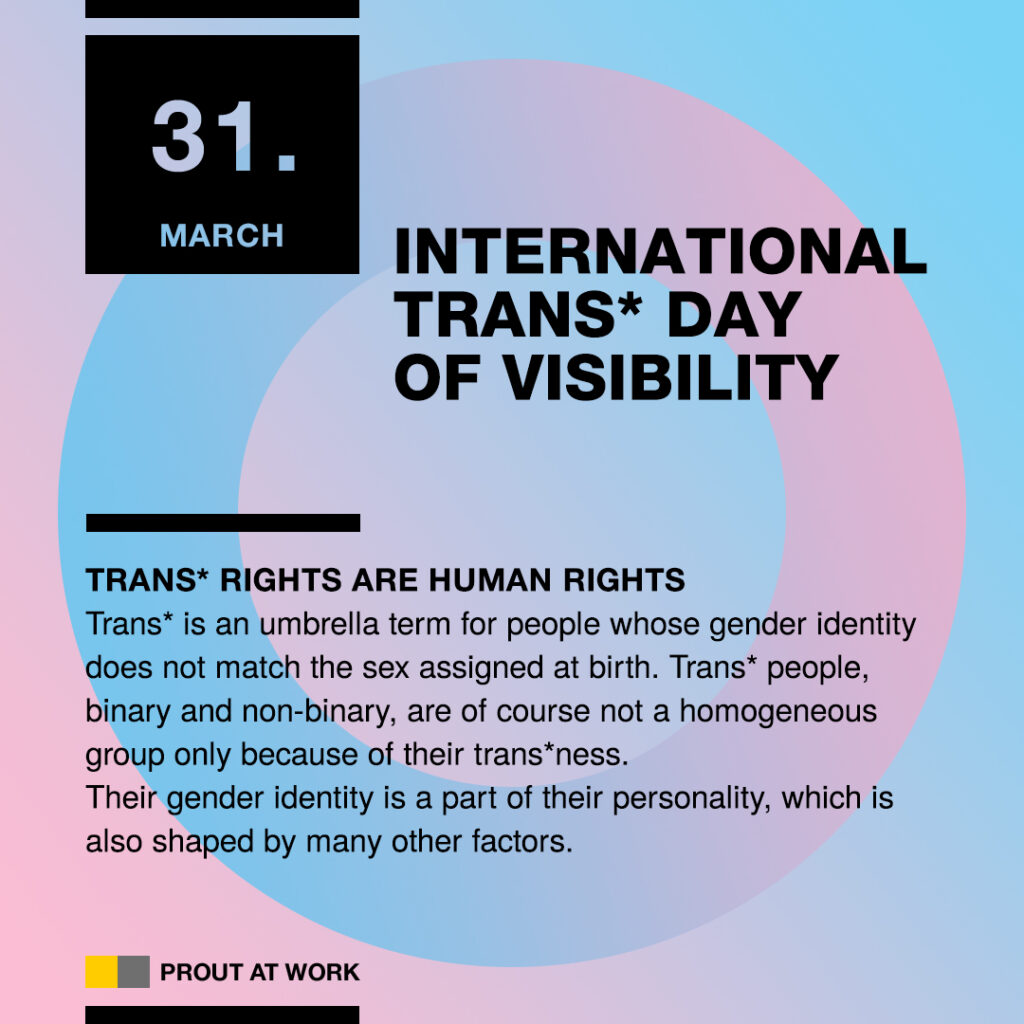
Trans* Day of Visibility (TDoV) has taken place each year on March 31 since 2009. The day is dedicated to raising awareness and visibility for trans* people and drawing attention to existing discrimination and transphobia. The day also provides a special opportunity for cis people to show solidarity with trans* people and stand up for equal rights. For us it is clear: #TransRightsAreHumanRights.
Trans* is used adjectivally and serves as an umbrella term for people whose gender assigned at birth does not match their gender identity. The asterisk (also asterisk) represents the multiplicity of possibilities of gender identities and gender expressions. Trans* thus refers to a diverse spectrum of identities, lifestyles and concepts that do not (want to) be located exclusively in a binary way.
All people should have the right to determine their own definition of their gender identity. The so-called “Transsexuellengesetz” (TSG) has prevented this for decades and is an example of the ongoing discrimination against trans* people. A new self-determination law must replace the TSG in order to protect trans* people from lengthy and humiliating procedures and make it easier to uphold their basic and human rights.
More information about trans* and trans* people can be found on Queerlexikon.
On the occasion of this year’s TDoV, we want to present you with the books “Being Human” by Alice Oehninger and “Ich bin Linus: Wie ich der Mann wurde, der ich schon immer war” by Linus Giese, the movie “Trans – I Got Life” and the MyStory’s by Hanna Brungs and Marit Wiechmann, personal stories of trans* people, but also tips and information about trans* at the workplace via our How To Guide No. 9 “Trans* and Transitions at the Workplace”.
ICH BIN LINUS: WIE ICH DER MANN WURDE, DER ICH SCHON IMMER WAR By LINUS GIESE

Linus has suspected that he is trans* since he was six years old. But out of shame and ignorance about terms such as queer, trans* and non-binary, he hid his true self for a long time. In 2017, he frees himself from his old life with the sentence “I am Linus”. In his book, Linus Giese also talks openly about the highs and lows of his journey, on which he repeatedly encounters hatred, especially on the internet. But that doesn’t stop him from standing up for the rights of trans* people.
Bein Human – An Autobiography by Alice Oehninger

Alice is trans*. She looks like a white boy. In traditional Tanzania, she is expected to play this role. She goes through love and rejection and discovers a strong desire to be a parent. Playing the role of a man, she marries and finds happiness in Germany until a crisis destroys her fragile world.
Meetings and border crossings in cultures and gender. A very personal story that touches and invites reflection.
Trans – I Got Life
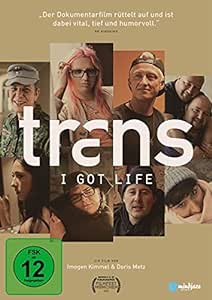
TRANS – I Got Life distils the broad spectrum of trans identity from the life stories of seven charismatic people. TRANS – I Got Life is a sensual journey into the in-between worlds beyond fixed gender norms, into intimate living spaces and into surgery, which becomes a delivery room for a second birth. In a subtle and multi-layered way, the trans experience is also transferred to the visual and audio level.
Creating a trans*-Inclusive Business – How To Guide Nr. 9
The guide covers the topic of trans* in the workplace and addresses employers, colleagues and trans* people themselves. It contains tips, information and experience reports to raise awareness and educate people on the topic. In addition, an exemplary process of a transition at the workplace is outlined and assistance for communication is offered.
Night of Realization – MyStory with Hanna

For a very long time I was searching for myself and at times I confused this with the search for other, material things – and I had to realize that these things did not really make me happy.
TRANS* IS SOMETHING WONDERFUL – MyStory with MArit Wiechmann
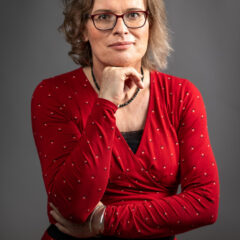
As a woman, I now have the courage to do things, make decisions and accept help. Why? What could happen if something goes wrong? After all, I am a human being with strengths and weaknesses and I am allowed to make mistakes, but also to be successful.
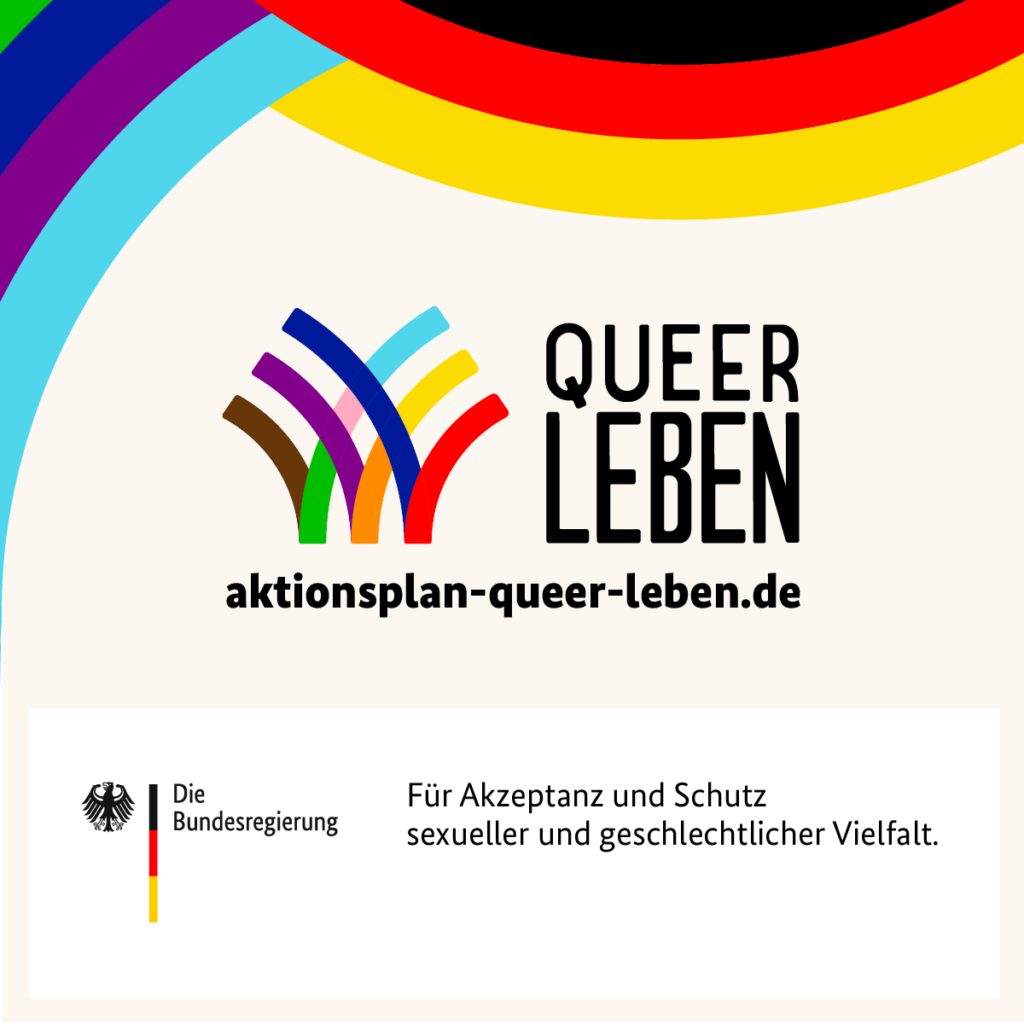
On November 18, the federal cabinet decided on the action plan “Queer Leben”, as scheduled in the coalition contract. Different plans for acceptance and protection of sexual and gender diversity were hilighted, and six topic points were solidified:
- Recognition by law
- Participations
- Security
- Health
- Strenghtening of the Communities
- International issues
Update March 22, 2023
On March 20, the Queer Representative of the Federal Government Sven Lehmann welcomed to the launch event of the Aktionsplan “Queer Leben” in Berlin. PROUT AT WORK, together with numerous organizations, belongs to the circle of those who bring the action plan to life.
The aim of the event was to launch the official implementation of the action plan. The more than 200 participants from various associations and organizations exchanged ideas and formed working groups, which in turn will discuss the concrete implementation of the action plan’s projects in the coming months.
Prior to the event, 78 civil society organizations were selected from more than 140 applications in order to bring as many different perspectives as possible to the working groups. We are very pleased that PROUT AT WORK is also one of the selected organizations and will be represented by our board member Albert Kehrer.
The launch event as well as the formation of working groups represent the first necessary steps towards the implementation of the action plan for a queer-friendly society and we are looking forward to placing important topics around LGBT*IQ in the workplace there in the future.
THE AKTIONsPLAN IN THE WORK CONTEXT
In addition to topics such as the Self-Determination Act, the reform of the Parentage Act, and blood donation, other issues important to the work context were also addressed under the heading of “participation”. These include the following measures:
- Expansion of the diversity topic pillar as part of the “New Quality of Work (INQA)” initiative of the Federal Ministry of Labor and Social Affairs (BMAS);
- Research projects on the situation/discrimination of LGBT*IQ in the world of work as well as improving the promotion of projects for acceptance;
- Development of a guideline for employers that includes the recommendations for action of two studies on the “Third Option” in a comprehensible way for use in everyday work;
- Sensitization of employers, trainers, employee representatives for the concerns of LGBT*IQ employees and applicants;
- Support for raising awareness of LGBT*IQ issues in in-company training;
- Establishment of a dialogue process (federal government, states, collective bargaining parties, church employers) on improving the working conditions of LGBTIQ* in institutions of churches and religious communities;
- Promotion of diversity management in the federal public service;
Additional measures in the area of federal administration:
- Development of an internal federal diversity strategy (incl. creation of further training opportunities, support for the establishment and networking of employee networks and a strategy for diversity-sensitive personnel selection procedures);
- Implementation of diversity issues (incl. LGBT*IQ/gender identity) in initial, further and advanced training (e.g. qualification measures by the Federal Ministry of Defense [BMVg] in civilian and military training and by the Federal Foreign Office in training in the Foreign Service); Regularly strengthening the educational and advisory competence of the social service in the Bundeswehr on the diversity issue; Conducting systematic baseline analyses on the situation of LGBT*IQ (e.g., with the help of employee surveys);
- Sensitization of employees to implicit prejudices and integration in competence requirements/competence models;
- Sensitization and, if necessary, training of employees involved in recruitment processes;
For more information about the plan “Queer Leben”, feel free to drop by the Federal Ministry for Family Affairs, Senior Citizens, Women and Youth.
PROUT AT WORK Welcomes the Action plan “Queer Leben”
“In addition to topics such as the overdue Self-Determination Act, the reform of the Parentage Act, and a reform of blood donation, the action plan also addressed other aspects that are important for the work context, which we very much welcome and which provide important impetus for our work.” Albert Kehrer, CEO of PROUT AT WORK.

For more information around trans* in the workplace, the third option, and other workplace related LGBT*IQ topics, we encourage you to check out our free HOW TO guides.
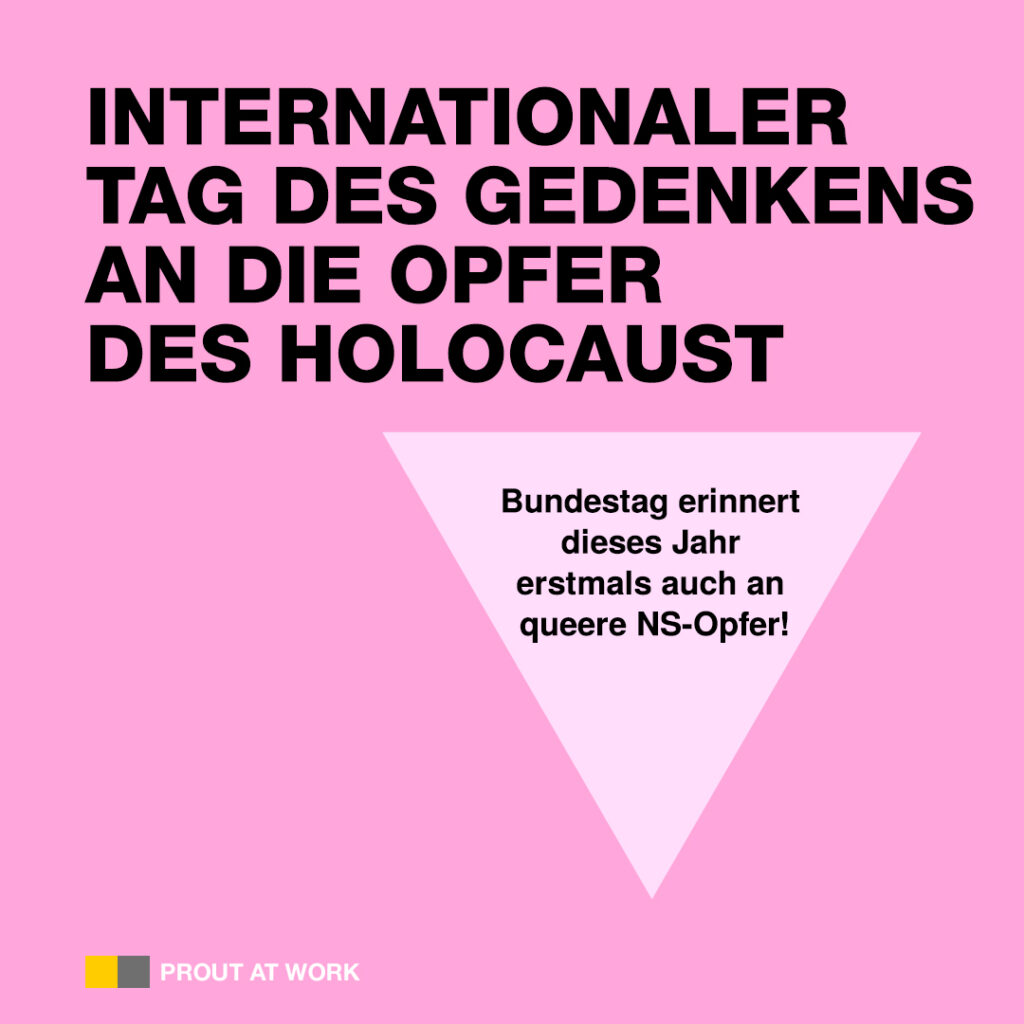
Today is World Holocaust Memorial Day!
We commemorate the victims of National Socialism and its inhuman atrocities. In the deadly ideology of the Nazis there was no place for people who did not correspond to their image of man. They were consistently persecuted, imprisoned, deported to concentration camps and murdered en masse. The organized genocide of European Jews, the Shoah, and of Sintize and Romnja, the Porajmos, was a unique breach of civilization in history. The Day of Remembrance of the Victims of the Holocaust is celebrated on January 27, the anniversary of the liberation of the Auschwitz-Birkenau concentration camp.
Among those persecuted under National Socialism were also queer people. They were also imprisoned by the Nazis and murdered in concentration camps. An estimated 78,000 gay and bisexual men were identified and 15,000 deported during the Nazi era. 53,000 were convicted between 1933 and 1945. Lesbian women were not granted sexual self-determination – they were persecuted and imprisoned as “asocials.” Trans* persons were persecuted under the same categories. The estimated number of LGBTIQ victims of the Nazi regime is high and many people do not know that homosexual and trans people were also murdered in the concentration camps.
This year, for the first time, the German Bundestag is focusing on queer victims of National Socialism during the hour of remembrance on January 27. As a foundation that advocates for LGBTIQ people in the workplace and their rights, we welcome this novelty. Especially because the struggle for rights and protections under the law for LGBTIQ people can be far from over.
For example, Paragraph 175, which legitimized the persecution and imprisonment of homosexual people in the Nazi regime, was adopted by the Federal Republic after the end of the war. In the FRG and the GDR, homosexuals continued to be persecuted on this basis for decades. Homosexuality has not been punishable in the reunified Federal Republic until 1994.
More information on the situation of queer people in the NS
Moving critical Masses
Let’s take action together to advance LGBT*IQ issues.
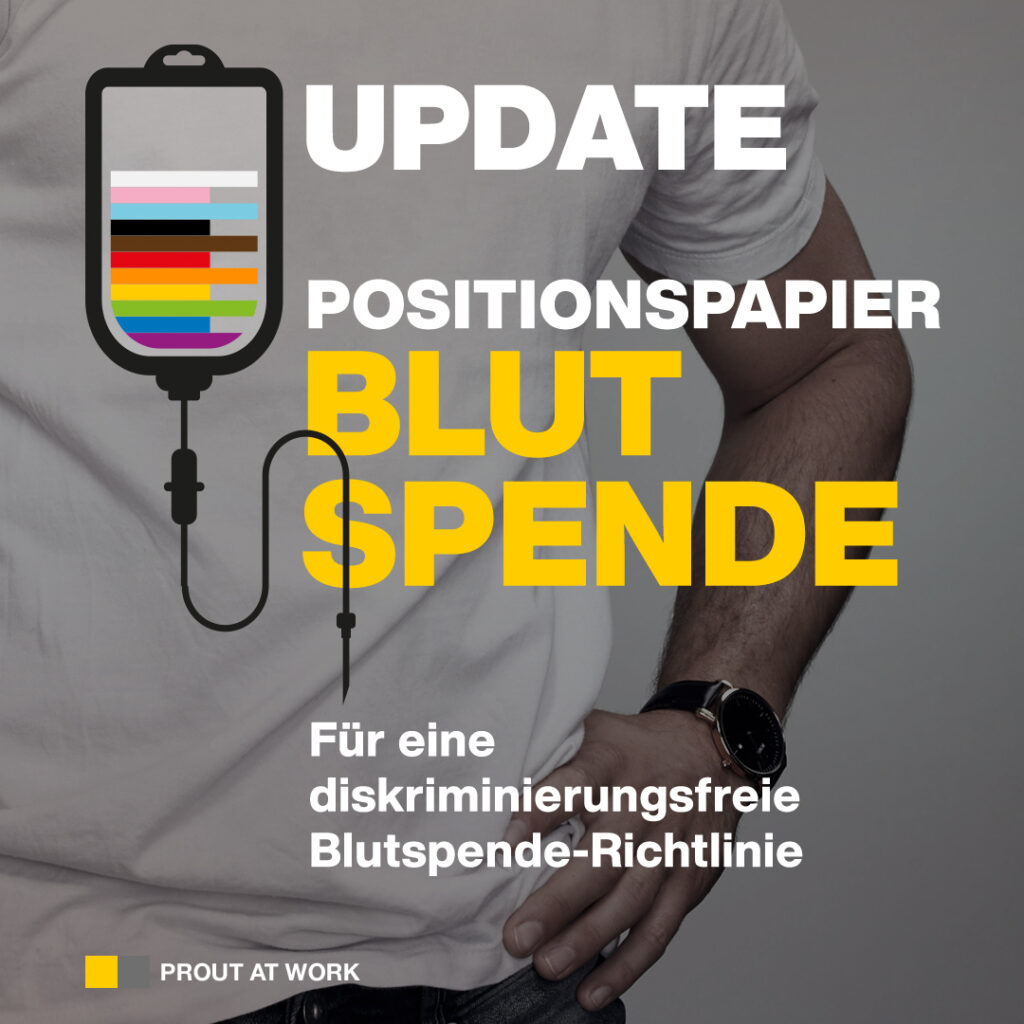
Update from the 16. of March 2023: On March 16, the Bundestag decided to end the existing discrimination in blood donation. As a result of the amendment to the Transfusion Act, the German Medical Association is now required to issue new guidelines for blood donation.
Specifically, the resolution states, “The assessment of a risk due to sexual behavior that leads to exclusion or deferral from donation must be based on the individual sexual behavior of the person willing to donate. The sexual orientation and gender identity of the person willing to donate or the sexual partners of the person willing to donate shall not be considered in the evaluation of the risk leading to exclusion or deferral from donation.”
Update on blood donation: According to current reports, a further step against discrimination against gay and bisexual men and trans* people will be taken from April 1, 2023 and a provision from the current coalition agreement will be fulfilled. Currently, there is a four-month provision period for “people with sexual risk behavior.”
The new regulation would require the Federal Medical Association by law to work with the Paul Ehrlich Institute within four months to adjust the guidelines to eliminate the four-month deferral period for gay and bisexual men and trans* people due to sexual contact with more than one person. Karl Lauterbach, the Federal Minister of Health, said: “Blood donation is a matter of risk behavior, not sexual orientation. There must be no hidden discrimination on this issue either.” With this, Lauterbach makes it clear that the deferral from blood donation is an outdated, discriminatory concept and that the risk behavior (in this case frequently changing sexual partners*) of all people should be valued equally.
But what is it actually about? Read more about the topic on our website.
Moving critical Masses
Let’s take action together to advance LGBT*IQ issues.
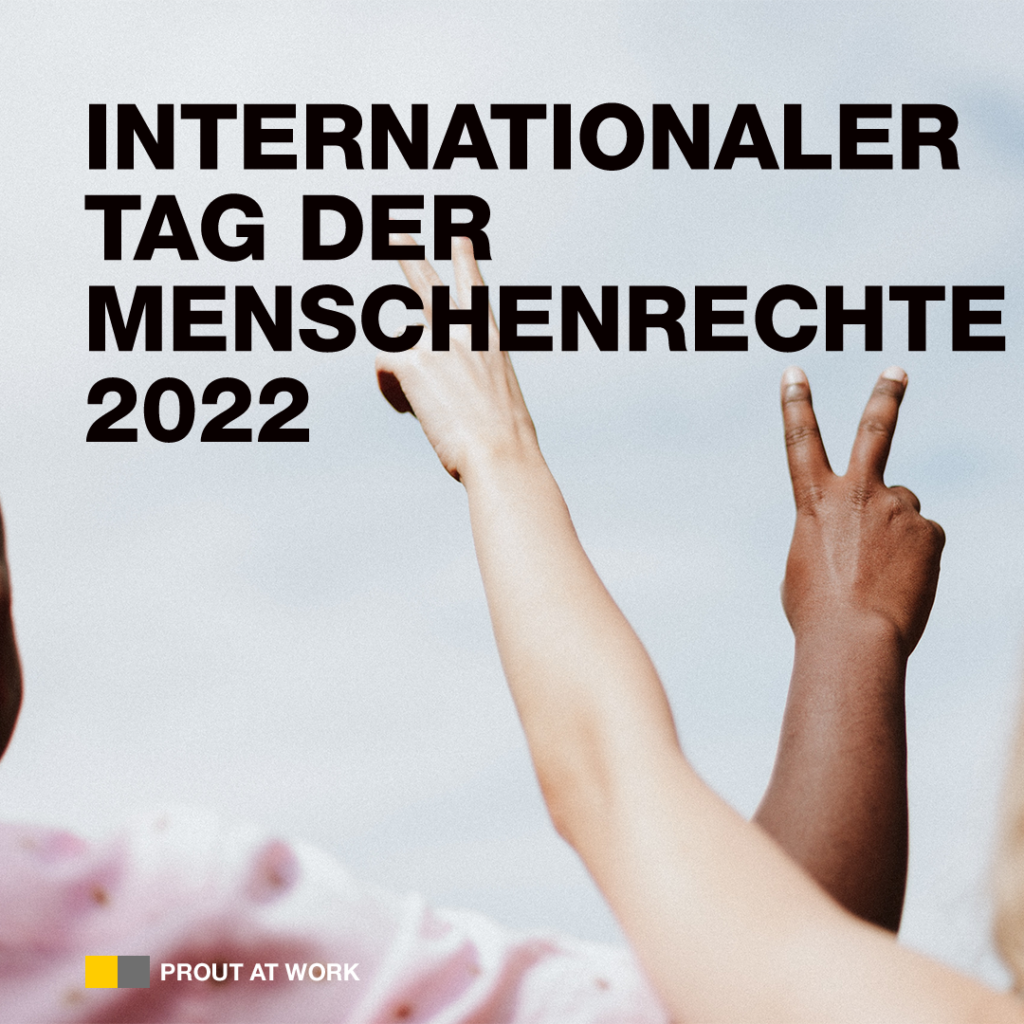
International Human Rights Day is a commemorative day that takes place annually on December 10 and will reach its 75th anniversary next year. In 1948, the United Nations General Assembly agreed on a Universal Declaration of Human Rights, which was signed by 48 countries.
After the end of the Nazi regime and the horrors of World War II, the aim was to create a comprehensive basis for a worldwide understanding in which all people are equal.
The International Declaration of Human Rights in one click (German):
At the heart of this declaration is the universal validity of fundamental rights that every human being has from birth and that are independent of origin, gender, religion, worldview, culture or other affiliations.
The principles laid down include, for example, the right to life, liberty and security, a ban on slavery and torture, freedom of thought, belief and expression, the right to education, work, health and many others, such as the right to citizenship and political participation.
For the first time in history, rights were formulated that should apply equally to every human being. Nevertheless, the Universal Declaration of Human Rights is not binding under international law. It is true that many states (such as the Federal Republic of Germany) have decided to base their constitutions on human rights and thus make them legally binding in part. However, there is no globally valid obligation, e.g. even beyond the United Nations, to observe human rights, nor are there any bodies that could guarantee enforcement.
Especially against this background, the International Human Rights Day is an important moment to remind that these universal rights are far from being universally enforced. Human rights are perhaps the most important yardstick and basis for creating a democratic world in which all people are equal before the state, the law and their fellow human beings. Therefore, we as a foundation also make it clear that our issue, equal opportunities for LGBT*IQ in the (working) world, must be understood as an issue of human rights and human dignity. We join this year’s slogan of the International Human Rights Day and stand up for
„Dignity, Freedom, and Justice for All“!
You can find information on this year’s slogan and International Human Rights Day at United Nations:
Moving critical Masses
Let’s take action together to advance LGBT*IQ issues.

October 19 is International Pronouns Day!
Individual Pronouns are strongly interlaced with the identity and selfgovernment of LGBT*IQ-people. Especially people, who do not strictly experience their gender in a binary sense of male/female, but may identify as genderfluid or nonbinary, use pronouns to express their gender, as not to be judged by their looks, or be misgendered.
In some cases, neopronouns are preferred (for example dey/dem), in other cases no pronouns are used at all, instead their name is used.
Pronouns can help get rid of biases about a persons gender, and they create diversity in the community.
Many people in the LGBT*IQ-Community use them to take a stand against solely binary understanding of gender, and to feel safe and happy with their own identity.
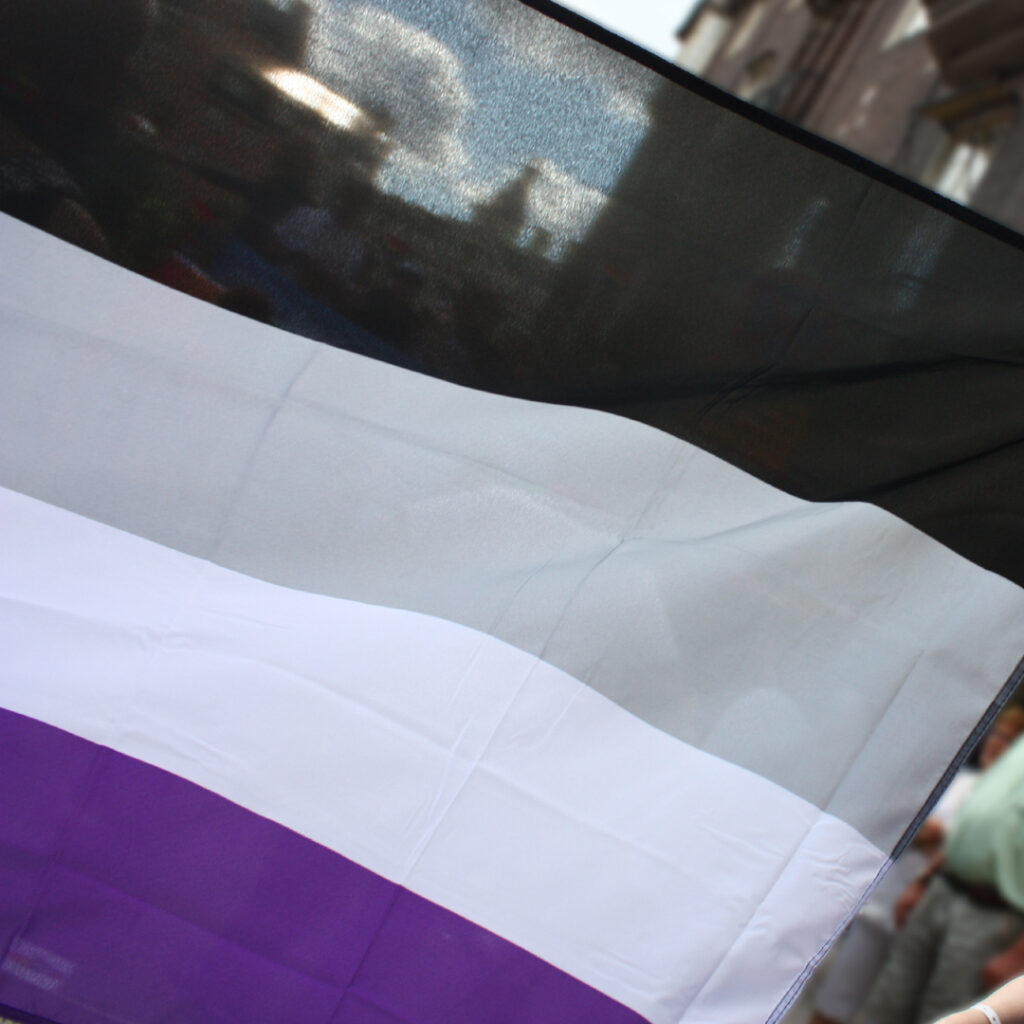
Ace Week (formerly known as Asexual Awareness Week) is celebrated on the last week of October every year since it was founded in 2010. This year it falls on the week of the 24-30. of October. It exists to make asexuality visible and to give asexual people the possibility to air their experiences.
The word “asexual” is derived from the latin prefix “a” or “ab”, meaning “none” or “without”, and hints at very little or no sexual attraction to others and/or themselves.
Asexuality is not connected to the celibate. that means asexual people don´t actively decide not to have sex due to religious or other reasons. despite being asexual, asexual people can still have sex due veried reasons.
This fact differenciates asexuality from antisexuality, where even the idea of sexual acts is rejected. additionally, asexuality doesnt relate to repressed sexuality or fear. Ace people simply dont feel a desire towards sex. Estimates put around 1% of humanity in the asexuality spectrum.
The symbolism behind the Asexuality flag:
• Black stands for asexuality
• Greysymbolizes the asexual spectrum
• white represents sexuality
• purple stands for community
The symbolism behind the Aromantic flag:
• Dark and light green represent the aromantic spectrum
• white symbolizes platonic relationships
• Grey and black stand for the asexual spectrum
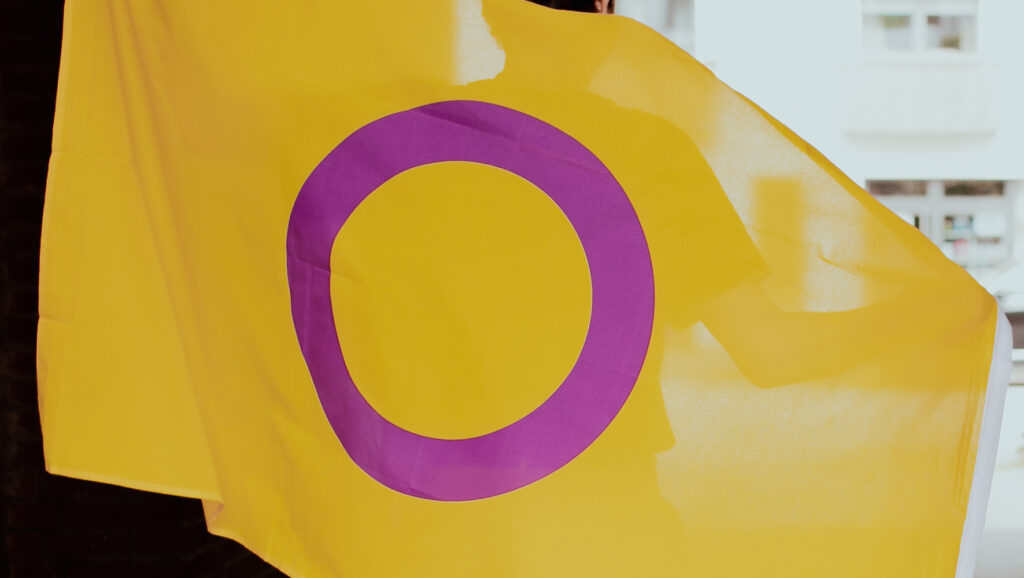
Intersex Awareness Day was founded in 1998 and takes place on the 26. of Oktober every year. This day is supposed to raise awareness for the Inter* sex community, and shed light on their struggles, discrimination and everyday issues. It is derived from the latin prefix “inter” which means “in between”.
Intersex is a term to describe every person with biological assets (chromosomal, gonodal, hormonal, anatomical) that have more than only male or female significance. in some cases, intersexual assets might be visible at birth, in other cases theyre not visible until puberty. some hormonal or chromosomal variations might not be visible at all.
Intersex is a term to describe every person with biological assets (chromosomal, gonodal, hormonal, anatomical) that have more than only male or female significance. in some cases, intersexual assets might be visible at birth, in other cases theyre not visible until puberty. some hormonal or chromosomal variations might not be visible at all.
Intersexuality exists in many different ways, cause beside the “standard” sets of chromosomes XX and XY, there are still more ways ( for example XXY) for the chromosomal attributes of a person. there is no “right” way to be Intersex. Intersexuality is due to biological attributes, and differentiates from sexual- and gender identity.
A big step towards freedom and self-decided lives for Intersex people was achieved in 2021, with a new law that forbids genital surgery on Intersex children.

